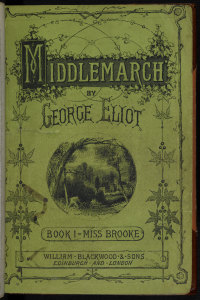 My favorite book, still, after decades of reading it, teaching it, and writing about it, is Middlemarch. I once began a lecture on it with this howler: “It is a little known fact that Mary Ann Evans (alias George Eliot) was actually the illegitimate child of Jane Austen and Walter Scott.” I retracted it immediately, of course—you never do know what students will believe. But Eliot does bring together, to an astonishing degree, Scott’s perceptiveness of how broad movements of history and cultures shape the consciousness of the ordinary people, and Austen’s keen sensitivity to the minutiae of family and village life, her brilliant understanding of her characters’ consciousness, and her biting wit. Eliot reflects often on the need for both macrocosmic and microcosmic attention, and Middlemarch, to a remarkable degree, demands and rewards both.
My favorite book, still, after decades of reading it, teaching it, and writing about it, is Middlemarch. I once began a lecture on it with this howler: “It is a little known fact that Mary Ann Evans (alias George Eliot) was actually the illegitimate child of Jane Austen and Walter Scott.” I retracted it immediately, of course—you never do know what students will believe. But Eliot does bring together, to an astonishing degree, Scott’s perceptiveness of how broad movements of history and cultures shape the consciousness of the ordinary people, and Austen’s keen sensitivity to the minutiae of family and village life, her brilliant understanding of her characters’ consciousness, and her biting wit. Eliot reflects often on the need for both macrocosmic and microcosmic attention, and Middlemarch, to a remarkable degree, demands and rewards both.
It is also, still, the most intellectually rich novel I have ever read: Eliot’s formidable and voracious intellect had her reading cutting-edge work across all the fields during the 19th century’s explosion of scientific and social-scientific research and theory, all of which contributes to this grand “Study of Provincial Life,” a novel that is practically a liberal education in itself—and for all that, remains a delightful and compelling story. Who could ask for more?


